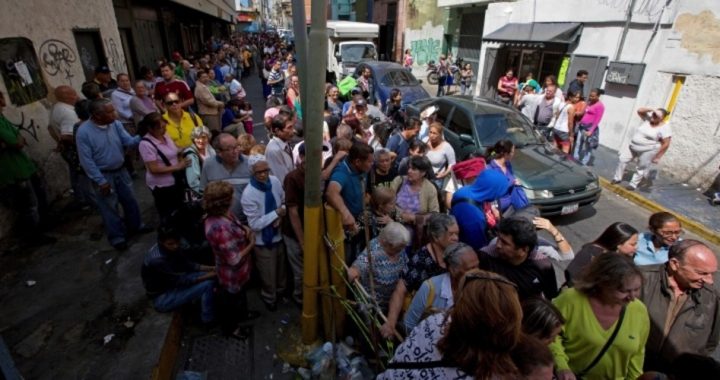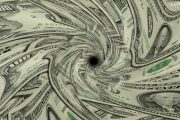
In December 2014 citizens of Venezuela paid 2,632 bolivars for a pound of meat. A year later they paid 14,138 bolivars, a 537-percent increase. They paid 3,066 bolivars for a supply of fruits and vegetables a year ago; last month they paid 12,118 bolivars, a 395-percent increase. For milk and cheese, prices increased 371 percent, from 2,084 bolivars to 7,735.
For fish they paid 1,408 bolivars a year ago; a year later the price of fish jumped to 5,940, an increase of 422 percent. Fats and oils: 335 bolivars to 1,340, an increase of 400 percent. Non-alcoholic beverages were 409 bolivars a year ago; today, 1,123 bolivars, a 275-percent increase.
A year from now, Venezuelans will look back fondly at these as the “good old days,” thanks to runaway inflation that now grips the country. The IMF’s (International Monetary Fund) Western Hemisphere Director Alejandro Werner noted last week that “a lack of hard currency has led to scarcity of intermediate goods and to widespread shortages of essential goods — including food — [which is] exacting a tragic toll. Prices continue to spiral out of control.”
How far out of control? So far that those closely watching the situation implode in Venezuela can’t keep up. Venezuela’s central bank estimated that in the third quarter of last year, inflation was over 140 percent on an annualized basis. The IMF had earlier predicted inflation for 2016 at 720 percent, which is quadruple the median estimate of 12 economists polled by Bloomberg last month. Barclays looked at the implosion and concluded that Venezuela has now passed “the point of no return.”
The printing presses in Venezuela can’t print bolivars fast enough to keep up with demand, forcing Venezuelan president Nicolas Madura to place orders with currency printers in the United Kingdom, Canada, France, and Germany. The first five billion bank notes arrived in 36 Boeing 747 cargo planes late last year, with another ten billion expected to arrive in the next couple of months.
Ironically, the German printer Giesecke & Devrient is the same company that printed the banknotes following the First World War that fed Germany’s historic runaway inflation. That was a period remembered as a time when German money had to be carried in wheelbarrows, and was often used as kindling to start fireplaces during the cold German winters of the early 1920s.
The situation in Venezuela is getting close. Dinner in a nice restaurant costs a brick-sized stack of 100-bolivar notes while an arepa — a cheese-stuffed corn cake — costs 1,000 bolivars, or about one dollar. A two-bolivar note is used to hold a greasy fried turnover since the note is worth less than a paper napkin. Even professional kidnap-and-ransom gangs are demanding dollars instead of bolivars for the release of their victims.
The inflation is fueled not only by paper money being flown in by plane, but also by economic ignorance and political posturing bordering on manic. Using the crisis to capture more power unto himself, Madura blamed a “non-conventional war that attacks our homeland,” including websites that report his country’s currency destruction and a “savage” form of capitalism that is causing currency “manipulation.”
Maduro’s newly-appointed economic czar, Luis Salas, is even worse, if that were possible. Salas has written pseudo-scholarly screeds blaming businesses for the runaway inflation rather than his government’s policies. He even denies the existence of inflation. In one of those airy touchstones, 22 Keys to Understanding the Economic War, Salas wrote, “Inflation does not exist in real life. When a person goes to a shop and finds that prices have gone up, they are not in the presence of inflation.”
Instead, he says the cause is “speculative-parasitic-vulture capitalism” coupled with a “global war of the planetary plutocracy.”
What is the solution offered by these barmy socialist screwballs? Price controls. They have already shut down whatever existed of Venezuela’s free market economy and, in its place, has sprung up a thriving and healthy black market. It is helping Venezuelans find the essentials that used to be plentiful before these solutions were applied: chickens, paper goods such as toilet paper, cooking oil, sugar, medicines, and aspirin. Doctors are forced to work without painkillers, with patients being urged to come to a hospital bringing their own disinfectants, gauze, and bandages since the hospitals have none.
Another solution is the use of government force, to bring back into line those “capitalists” who are “gouging” innocents by raising their prices. In November 2013, Maduro sent troops to take control of five Daka retail stores and force the managers to sell their goods at government-decreed prices. When the managers refused they were arrested and charged with selling their goods at inflated prices.
Another measure of the insanity infecting the highest levels of Maduro’s government was the announcement by Herbert Garcia Plaza, Maduro’s high authority for the defense of the economy, a month after the military raid that the stores would be restocked and back to normal shortly. Many of those stores remain empty today, with one survivor in the Bello Monte municipality of Caracas having only a few plates, a small oven, a pot, a blender, and a toaster for sale.
Now that Maduro has gathered to himself the power to enforce his government’s regulations onto the country’s businesses, more attacks like that on Daka — called Dakazo, or “the Daka smash” — are just a matter of time.
There is only one positive that may be gleaned from the destruction of Venezuela: It is likely to take millions of barrels of crude oil off the market, which, Tyler Durden at Zerohedge suggests, may put in a bottom for the price of oil: “Once [Venezuela’s] inevitable sovereign bankruptcy hits, the resulting chaos and collapse in oil production [thanks to] the political and power vacuum … will serve as just the supply drop buffer the world oil market so desperately needs.
It is doubtful that Venezuelans are likely to take any comfort in that when balanced against the destruction of their country’s economy, its takeover by its Marxist president, and the loss of the most valuable currency of all: their freedom.
Photo of people lining up outside a supermarket in Caracas, Venezuela, to buy toilet paper: AP Images
A graduate of an Ivy League school and a former investment advisor, Bob is a regular contributor to The New American magazine and blogs frequently at LightFromTheRight.com, primarily on economics and politics. He can be reached at [email protected].
Related article:
Hyperinflation Imminent in Venezuela From Socialist Reforms




